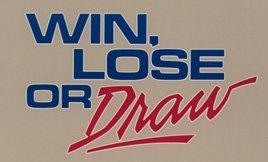Related Research Articles

Match Game is an American television panel game show that premiered on NBC in 1962 and has been revived several times over the course of the last six decades. The game features contestants trying to match answers given by celebrity panelists to fill-in-the-blank questions. Beginning with the CBS run of the 1970s, the questions are often formed as humorous double entendres.

Pyramid is an American game show franchise that has aired several versions domestically and internationally. The show was developed by Bob Stewart. The original series, The $10,000 Pyramid, debuted on CBS on March 26, 1973, and spawned seven subsequent Pyramid series. Most later series featured a full title format matching the original series, with the title reflecting an increasing top prize. Two teams, each consisting of a celebrity and contestant, attempt to convey mystery words and phrases within a common category, against a time limit, to win cash and prizes. The title refers to the show's pyramid-shaped gameboard, featuring six categories arranged in a triangular fashion. The various Pyramid series have won a total of nine Daytime Emmys for Outstanding Game Show, second only to Jeopardy!, which has won 13.

Name That Tune is an American television music game show. Originally created and produced by orchestra conductor Harry Salter and his wife Roberta Semple Salter, the series features contestants competing to correctly identify songs being played by an on-stage orchestra or band.

Eye Guess is an American game show created by Bob Stewart and hosted by Bill Cullen that aired on NBC from January 3, 1966, to September 26, 1969. The game combined a general knowledge quiz with a Concentration-style memory element, in which the answers were shown to the players and their recall of their positions was tested.

Password is an American television game show. Two teams, each composed of a celebrity and contestant, attempt to convey mystery words to each other using only single-word clues, in order to win cash prizes. Various incarnations of the show have aired on television since the 1960s.

Win, Lose or Draw is an American television game show that aired from 1987 to 1990 in syndication and on NBC. It was taped at CBS Television City, often in Studios 31, 33, and 43 at various times. It was co-produced by Burt & Bert Productions and Kline & Friends for Disney's Buena Vista Television. It has also had two versions on The Disney Channel: Teen Win, Lose or Draw from 1989 to 1992, and a revived version known as Disney's Win, Lose or Draw which aired in 2014. New York described Win, Lose or Draw as "a knockoff" of the board game Pictionary, however, Burt Reynolds and Ed McMahon referred to playing the game at Burt's home during the August 2, 1978 episode of The Tonight Show Starring Johnny Carson, three years before Pictionary was created.

Chain Reaction is an American television game show created by Bob Stewart, in which players compete to form chains composed of two-word phrases.

Body Language is an American television game show produced by Mark Goodson Productions. The show aired on CBS from June 4, 1984, until January 3, 1986, and was hosted by Tom Kennedy. Johnny Olson was the announcer until his death, after which Gene Wood and Bob Hilton alternated in the role. The show pitted two teams against each other, each consisting of a contestant and a celebrity guest, by using charades to convey words in a word puzzle.

Celebrity Charades is a game show that originally aired from January to September 1979 as a syndicated series throughout the United States.
Liar's Club is an American game show, originally produced by Ralph Andrews, featuring a panel of celebrity guests who offered explanations of obscure or unusual objects. Contestants attempted to determine which explanation was correct in order to win prizes.
Pictionary is an American television game show which aired in syndication during the 1997–1998 season. The game was based on the board game of the same name where contestants guessed words and phrases based on drawings. Alan Thicke hosted the show with Joe Cipriano announcing. The series was a production of Kline and Friends and was distributed by Worldvision Enterprises.
Celebrity Sweepstakes is an American television game show that aired on NBC's daytime schedule from April 1, 1974, to October 1, 1976. The show also had two separate weekly syndicated runs from September 9, 1974, to September 1975 and again from September 20, 1976, to May 23, 1977.
Wheel of Fortune is an Australian television game show produced by Grundy Television until 2006, CBS Studios International in 2008, and Whisper North, in association with Sony Pictures Television and Paramount Global Content Distribution, in 2024. The program aired on the Seven Network from 1981 to 2004 and January to July 2006, aired at 5:00 pm from 1981 to 1989 and from 2004 to 2006 and at 5:30 pm from 1989 to 2003, and is mostly based on the same general format as the original American version of the program.

You Don't Say! is an American television game show that had three separate runs on television. The first version aired on NBC daytime from April 1, 1963, to September 26, 1969, with revivals on ABC in 1975 and in syndication from 1978 to 1979. The last two incarnations were executive produced by Ralph Andrews and produced and directed by Bill Carruthers.

Pantomime Quiz, initially titled Pantomime Quiz Time and later Stump the Stars, was an American television game show produced and hosted by Mike Stokey. Running from 1947–59, it was one of the few television series – along with The Arthur Murray Party; Down You Go; The Ernie Kovacs Show, The Original Amateur Hour; and Tom Corbett, Space Cadet – to air on all four TV networks in the US during the Golden Age of Television.
PDQ and Baffle are American television game shows created by Heatter-Quigley Productions. Both shows' objective was for contestant/celebrity teams to guess a given word or phrase in the shortest amount of time with the fewest letters given as possible.

Showoffs is an American television game show which ran on ABC from June 30 to December 26, 1975. Bobby Van was host, with Gene Wood as announcer. The Mark Goodson-Bill Todman production involved two teams competing in a game of charades.
Pyramid is an Australian children's quiz show screening on the Nine Network from 2009 to 2015 hosted by Shura Taft. It is co-produced by Sony Pictures Television and produced by Sydney-based Ambience Entertainment. It began broadcasting on 1 September 2009 and is filmed in front of a live studio audience. It involves two teams competing in games of "vocal charades". The show is based on the 1979 United States game show The Junior Partner Pyramid, a children's variant of the Sony Pictures Television Pyramid franchise.
All-Star Squares is the Australian adaption of the American game show Hollywood Squares that aired on the Seven Network in 1999, hosted by Ian 'Danno' Rogerson. Like the American version, the object of the game was to get three stars in a row, either across, up-and-down or diagonally. The contestant in turn, chose a celebrity, to whom host Rogerson asked a question. After (usually) a joke answer, they gave a response, to which the contestant either agreed or disagreed. If correct in their judgement, they received their mark in that box; if wrong, their opponent got the square.

People Puzzler is an American television game show hosted by Leah Remini that aired on Game Show Network from January 18, 2021 to November 3, 2023. The show is inspired by the celebrity and pop-culture themed crosswords in People magazine.
References
- ↑ "CABARET to CITY WEST - AUSTRALIAN TV". Memorable TV. Archived from the original on 26 April 2010. Retrieved 9 August 2010.